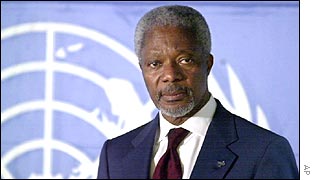| NEWS | SPORT | WEATHER | WORLD SERVICE | A-Z INDEX | ||||||||
|
| You are in: Technology | ||||||||||||||||||||||||||||||||||||||||||||||||||||||||||||||||||||||||||||||||||||||||||||||||||||||||||||||||||||||||||||||||||||||||||||||||||||||||
|
Sunday, 6 October, 2002, 11:15 GMT 12:15 UK
Annan on bridging the digital divide

Annan: Technology is a powerful instrument
The United Nations Secretary General, Kofi Annan, explains why he believes that information and communication technologies can improve the lives of people in developing countries.
Great hopes have been raised. The challenge now is to translate them into reality. There is a vast potential for investment growth in the developing countries. Information and communication technologies (ICT) can help us turn this potential into concrete opportunities that will help the poor work their way out of poverty, while at the same time benefiting the world community as a whole. ICT is not, of course, a magic formula that is going to solve all the problems. But it is a powerful tool for economic growth and poverty eradication Explore innovations But bridging the digital divide, in Africa and elsewhere, is a formidable task that requires not only leadership, but also a major commitment of resources.
But investments will still be necessary, not only to ensure that people have the technical skills and the literacy level needed to use information technology facilities and service them, but also to create content that reflects the interests of that part of the world. Clearly, if we are to succeed, the process must engage all stakeholders - donors, the private sector, civil society organisations, governments, and especially those in the developing world itself. The Millennium Development Goals, adopted by the world community at the highest level, should help rally all stakeholders around a common agenda. ICT is a powerful instrument for speeding up the realisation of these goals.
Now is time to think of partnerships and initiatives for concrete programmes and projects that will make a difference on the ground. Kofi Annan was speaking at the a meeting of the United Nations Information and Communication Technologies Task Force in New York on 30 September. |
See also:
16 Jul 01 | Science/Nature
02 Oct 02 | Technology
03 Oct 02 | Technology
Internet links:
The BBC is not responsible for the content of external internet sites Top Technology stories now:
Links to more Technology stories are at the foot of the page.
|
||||||||||||||||||||||||||||||||||||||||||||||||||||||||||||||||||||||||||||||||||||||||||||||||||||||||||||||||||||||||||||||||||||||||||||||||||||||
|
Links to more Technology stories |
 |
|
|||
| ----------------------------------------------------------------------------------
To BBC Sport>> | To BBC Weather>> | To BBC World Service>> ---------------------------------------------------------------------------------- © MMIII | News Sources | Privacy |